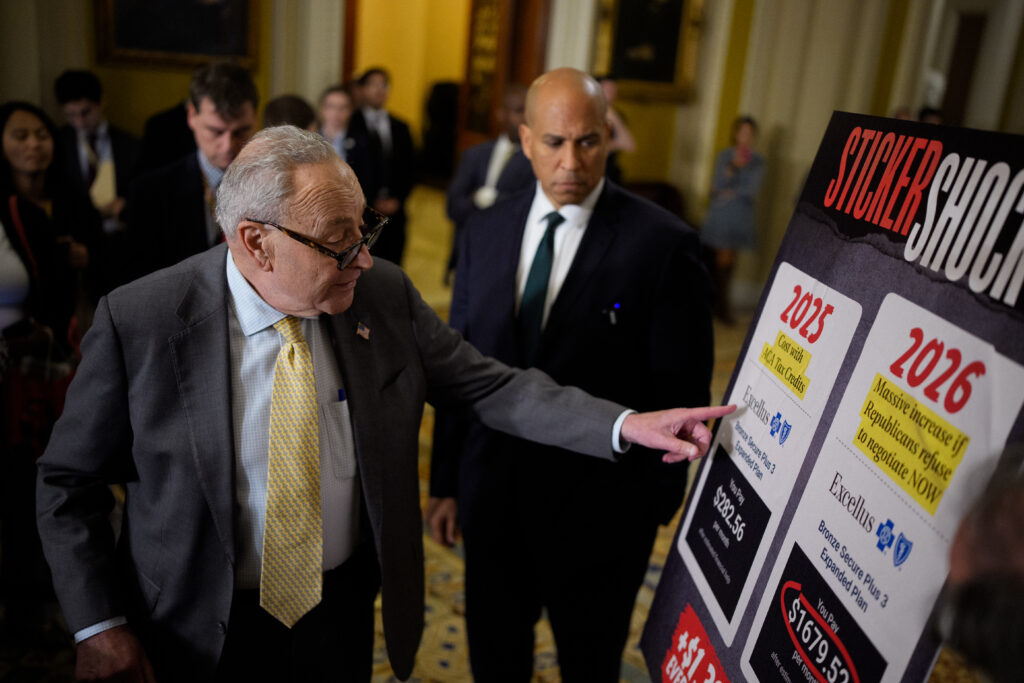Democratic U.S. Sen. Chuck Schumer of New York, accompanied by Democratic U.S. Sen. Cory Booker of New Jersey, points to a poster depicting rising medical costs if Congress allows the Affordable Care Act tax credits to expire. (Photo by Andrew Harnik/Getty Images)
States are preparing for the possibility of a rapid shift in the cost of Obamacare health plans, depending on whether Congress extends the subsidies that are at the center of the federal government shutdown.
No matter what Congress does, the amount insurers charge for coverage sold on the marketplaces created by the Affordable Care Act will increase by an average of 26% in 2026, according to KFF, a health research nonprofit. In the 30 states that use the federal Healthcare.gov, premiums will rise by an average of 30%. In the states that run their own marketplaces, the average increase will be about 17%.
But 22 million of the 24 million people who are enrolled in marketplace plans receive a tax credit. If Congress extends the credits, the amount subsidized enrollees pay each month won’t significantly change, even as insurers charge more.
If Congress doesn’t act, people with incomes below 400% of the federal poverty level will receive less financial help, while people making more than that amount will not get any help at all. As a result, according to KFF, monthly premium payments for all enrollees will increase by an average of about 114%,
For a month, Republicans and Democrats have been in a stalemate over whether to extend these subsidies, leading to a government shutdown. The situation has created ambiguity for the states that run their own marketplaces, as many of them move this weekend into the open enrollment period for people to purchase health plans.
Some states, such as Maryland, are preparing for a scenario in which they would either extend state-funded subsidies to enrollees to help them keep their plans, or rapidly apply federal subsidies if Congress extends them.
“It’s going to vary state by state based on their technological abilities and if they need to do anything with their rates,” Michele Eberle, executive director of the Maryland Health Benefit Exchange, said in a phone interview.
Eberle said Maryland created a state subsidy program to make up for some of the federal subsidies that are in limbo. She said that if Congress extends the subsidies, enacting changes for the state’s 240,000 marketplace enrollees could take around three weeks.
Maryland would have to ask health insurers to resubmit their rates. The state also might have to send notices to enrollees to give them the opportunity to change their choice of plan, according to Eberle.
“We would change [enrollees’] premiums. We would have to back out the state subsidy [that we] put in, if there’s a new rate, put the new rates in, recalculate the new premium tax credit and apply that,” Eberle said.
In California, where two million people are enrolled in Covered California, residents are already reeling from sticker shock after seeing next year’s premiums on the state’s website.
“People are very stressed about what to do and what their options are with these cost changes,” Jessica Altman, executive director of California’s marketplace, said in an interview. “At the same time, we are very much ready, and we’ll move any mountain that we can possibly move if Congress does act.”
Altman said the state will automatically recalculate what enrollees would pay for their plans if Congress extends the credits, and is prepared for people to want to change their plans if federal lawmakers act.
“We’re also very much going to want to inform our consumers and give them the opportunity to make a different choice,” she said.
Altman said notifying enrollees’ of changes should take a few weeks, but changing information in the state’s system should only take about a week.
“Even when the enhanced tax credits passed the first time, it was in the middle of the year, in the spring,” Altman said.
“All the state exchanges had to build that, and it was done in a matter of weeks, right? So, that’s who we are, and that’s how we’re thinking about this challenge.”

